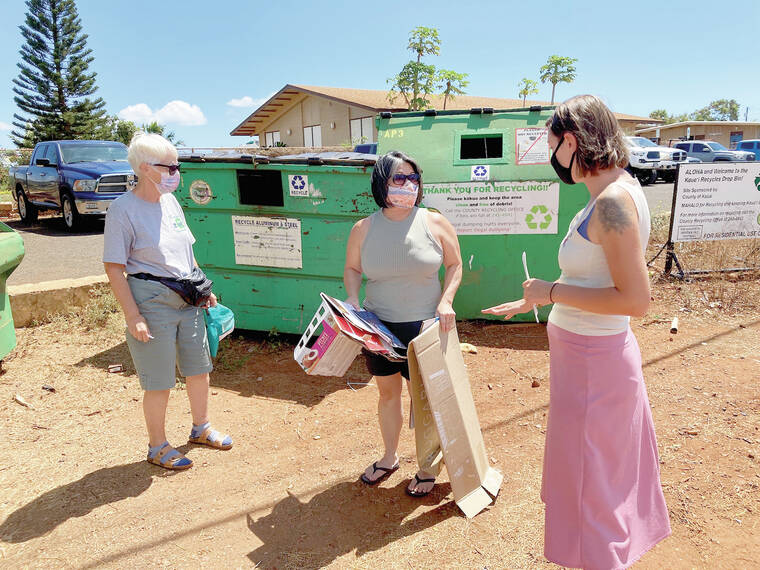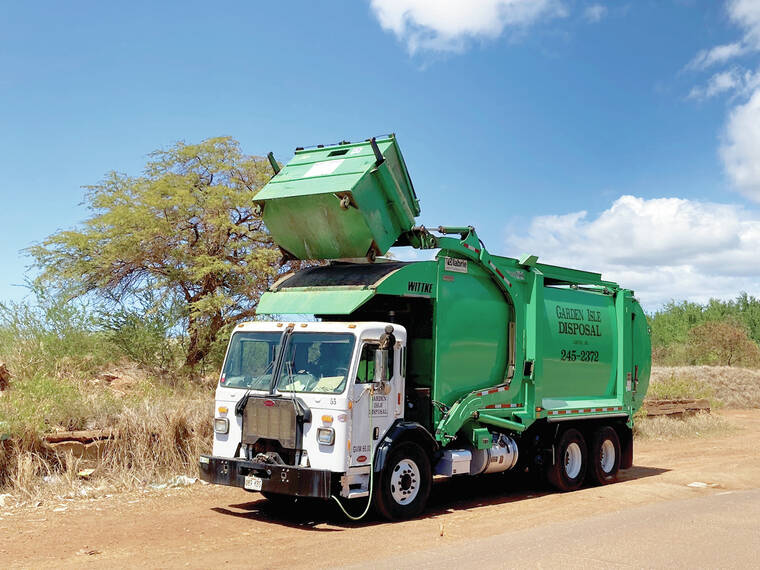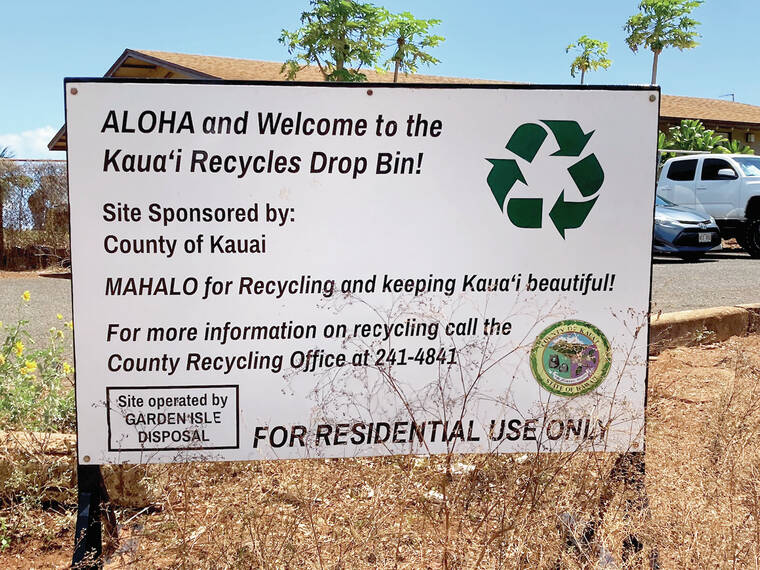HANAPEPE — Residents are confused, skeptical and critical of dirty recycling facilities, according to Zero Waste Kaua‘i.
The organization received a $9,240 grant from the county this summer, to survey residential recycling locations and monitor compliance with its disposable plastic policy. Zero Waste conducted its final survey last Wednesday, at the Hanapepe Refuse Transfer Station on Lele Road.
“This was something that (Department of Public Works Solid Waste Programs Coordinator) Allison (Fraley) said she has wanted to have done for a long time,” ZWK President Ruta Jordans said. “Somebody to just go talk to the people that are recycling and get their input on what they like, what they don’t like.”
To complete the project, Jordans and volunteer Pam Block surveyed seven of the island’s eight residential recycling sites twice (Kekaha Landfill was omitted). Both say many residents misunderstand recycling guidelines, often engaging in so-called wish-cycling.
“The biggest problem is always with plastic … there’s a very clear explanation on the bin, what you can and what you can’t recycle in it,” Jordans said. “Many people just see the word plastic and throw anything that’s plastic in there.”
Kaua‘i only accepts clean No. 1 and No. 2 bottles and jars with no caps. Other plastics and packaging, including black plastic, contain additives that affect the product’s melting point – a critical factor in the recycling process. Recyclers unable to guarantee their product’s melting point must often dispose of their entire load, according to the county.
The restrictive guidelines stem from China’s 2018 ban on the importation of most plastics, which cut the world off from its primary buyer of residential recyclables. China purchased 70% of Americans’ plastic waste in 2017, according to U.S. Census Bureau trade data report.
The ban also weakened the Kaua‘i recycling program in a less material way: residents now doubt their plastics are actually being repurposed.
“It seems like lately, the first thing they say is, ‘Is this actually getting recycled?’” Block said. “Everybody’s real skeptical of it in general.”
But the program really is what it claims to be, hence the county’s emphasis on disposal guidelines. Properly-disposed plastic waste is primarily sold in Asian markets like Malaysia and Jakarta, and there is “always a buyer” for metal, glass and paper products, according to Jordans.
Jordans and Block interviewed two residents in their first hour at the Hanapepe recycling bins. The first, Chris Ohara of Kalaheo, did not need pointers. The second, who declined to provide her name, expressed shock when Jordans and Block corrected her.
“Gee, I didn’t know that,” she said. “I used to save it all the time.”
Zero Waste has also recorded complaints of unclean conditions at some locations.
Contractor Garden Isle Disposal is required to keep the bin areas clean, according to Block, who said the dirtiest site is in Po‘ipu, at the Brennecke’s Beach Broiler restaurant parking lot on Ho‘one Road.
Residents expressed dismay with the bins’ close proximity to a nearby heiau, or Hawaiian temple, during both on-site surveys.
“Even if the site is pretty clean, there’s always stuff, so it’s just literally just going right in there,” Block said. “It seems like there should be a better spot.”
Zero Waste also reported most, but not all, of those surveyed expressed support for curbside recycling in the future.
All Kaua‘i recycling bins feature signage listing accepted waste. Lists, a program overview and item-by-item explainers are also available online at www.Kauai.gov/Recycling. A hyperlink to an illustrated flyer of accepted plastics may be found under the “Plastics Recycling and Packaging Reuse” tab.
Zero Waste will begin tracking compliance with the county’s disposable plastic policy when large public gatherings are permitted. The policy, which took effect in December 2020, restricts the purchase and use of single-use plastics on county-owned properties, including park pavilions and neighborhood centers.
•••
Scott Yunker, reporter, can be reached at 245-0437 or syunker@thegardenisland.com.






Put an extra green bin out for clam-shell plastic. Collecting it in bulk for possible future recycling is better than polluting current plastics.
Ideally, KI will require ALL of the grocery/food-providing businesses to STOP selling any food in clam-shell plastic.
RE: Poipu location: Please move it. Should be away from heiau & beach.
The signs on the bins are very clear, yet I see people putting recycling in (the plastics bin especially) that is not accepted. This screws up the entire load which is dumped as they point out in the article, so nothing in the bin is recycled. If you try to educate some people and show them the signs, they get angry. Others are oblivious.